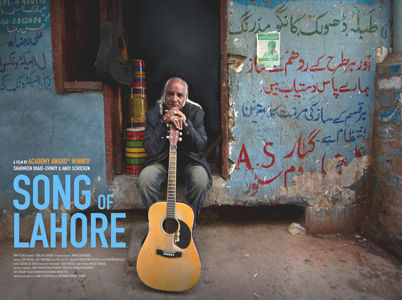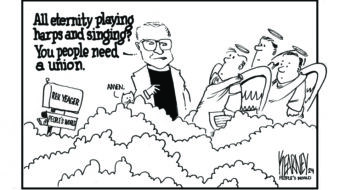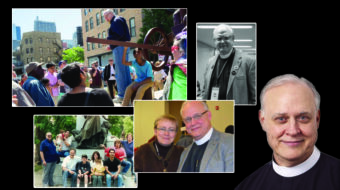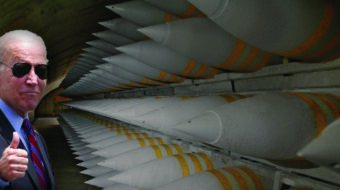
NEW YORK – In this fifth and last in a series of reports from this year’s Tribeca Film Festival, we look at a single day’s offerings.
One day in the life of the Tribeca Film Festival can raise many questions. Depending on what titles you select – and there are artful and thought-provoking films everywhere – you will be taken for a ride. Let’s begin with a train ride. Can a movie like In Transit, simply a collection of people talking on a train, be worth seeing? In this case, when it’s directed by the iconic Albert Maysles (who passed away this year) the answer is a resounding “yes!” Young and old, men and women, Black and white, make new friends and share their most profound thoughts. It’s a testament to humanity and a tribute to the memory of Maysles. It’s made in his famous “Direct Cinema” style: No narration or voiceover, simply natural soundtrack.
Next we have the question, Can a conservative evangelist preacher support gun control? Armor of Light follows evangelical Rev. Rob Schenck, close confidant to Washington’s ultra-right politicos, through his torturous discovery that pro-life and pro-guns do not go together. If ever a movie has captured political enlightenment and a major shift in political position, this film does. With his Jewish background, and friendship with the Christian mother of a victim of “Stand Your Ground” violence, Schenck lets logic take its course. The viewer is delighted to see his transformation being presented to his former religious allies. This is a very compelling film, complex and enlightening, and the answer to the question is No!
We move on to All Eyes and Ears, that begs the question, “Can the American Empire convince China that we only want to be friends?” U.S. Ambassador to China, former Republican senator from Utah, Jon Huntsman, takes his extremely bourgeois family, including his cutesy adopted Chinese daughter Gracie, for a long stay in China. There, using all his diplomatic skills, while still trying to please his conservative constituency, he manages to use his young daughter as the link between the two cultures. Various experts are utilized, none from the left, to confirm that China may be a more formidable foe than we expected, in our imperial aims in Asia. Of course it’s never asked what the U.S. would do if China decided to encircle our country with military bases and start dictating how we should consider merging with their socioeconomic model. But then this is just another democratic capitalistic propaganda piece praising the lives of the rich and famous diplomatic family.
An even more troubling situation surfaces with A Nazi Legacy: What Our Fathers Did, a British production that films the grilling of two sons of Nazi leaders. One accepts his father’s guilt, and the other knew his father as only a loving soul. Can you sympathize with a son of a Nazi? The way the filmmakers browbeat the old son who only knew his father as a good man is heartbreaking at times. They further grease the pan by traveling to Ukraine to visit the neo-Nazis who consider his father a hero of WWII (and of course they are defenders of the new right-wing government of the Ukraine). With all this evidence, are we supposed to hate this son, who somehow cannot come to accept his father as a bad person? The answer is troubling and I leave it to you to see the film and make your own decision.
Several good films at the festival dealt with the Middle East. Good Kill shows Afghanistan by way of a military bunker in Las Vegas where soldiers who trained on Playstation use their computer skills to remotely control drones that kill people on the opposite side of the world. Ethan Hawke portrays a young pilot who is troubled by orders given to kill unconfirmed “terrorists” on a computer screen. Although the film is perceived by some as anti-war – there is a small move toward understanding Muslims as human beings – there are no real Arab actors who gain sympathy. Ultimately it’s about a pilot who prefers to fly a plane and kill “enemies” in the traditional manner. In the last, prescient scene the film warns that drones will certainly be acquired by our enemies, and they could soon be flying over Las Vegas too.
Two films deal with Pakistani Islamic extremism from totally different directions. Song of Lahore is about the great tradition of secular music that was lost in the surge of religious fundamentalism. Musicians determined to preserve their great musical history band together, preserving old melodies, rehearse and eventually get to perform at Lincoln Center of all places. Along the way we learn of all the musicians’ personal lives and hardships. The film is a heartwarmingly beautiful cultural preservation of Pakistani secular musical history. On the other side of the story is Among the Believers, a sobering examination of the growing religious fundamentalist movement. Tens of thousands of young believers are trained in religious schools (madrasas) to devote their lives to jihad and pledge allegiance to ISIS. With privileged access to the inner circles of the movement, its opponents, and children on both sides of the religious battle between moderates and fundamentalists, this honest and alarming doc delves into the meanings behind this growth. The film discusses the founder of the Red Mosque, Maulana Aziz, who served long sentences in prison and developed a strong distaste for Western imperialism and its abuse and destruction of the Middle East. This is a humanistic treatment of a very complex situation, a rare glimpse into something people in the West know little about.
Far from Men, reviewed at the Toronto Film Festival, deserves repeat mention. This stylish treatment of a moral schoolteacher faced with the dilemma of transporting a convict through the foreboding mountains to stand trial during the Algerian War, is reminiscent of the best Westerns. But this has a political component, as the teacher (played by Viggo Mortensen), who is also a former French soldier, has to defend an Algerian dissident, all played within the realities of wartime.
Ironically, another “Western” plays out on the other side of the world. Cartel Land tells the tragic story of the growth of drug wars in Mexico, where almost every citizen lives in fear of being drawn into the violence. The documentary infiltrates both sides of the battle, and blurs the lines between the good and bad guys. In a land becoming more lawless daily, are vigilantes justified in taking the law in their own hands? What happens when there is corruption on all sides of the battle? With amazing infiltration into torture chambers and gang hideouts, the directors risked their lives to bring one of the most stunning examinations of the failure of the War on Drugs to the screen. The answers are not clear, but the film is brilliant.
Awards were announced at the completion of the 13th annual Tribeca Film Festival in Lower Manhattan. The 12-day festival co-founded by actor Robert De Niro screened 89 feature films and 57 shorts to an audience of almost a half a million viewers, including panels and other special events. Just a few of those shorts that deserve mentioning:
The Trials of Constance Baker Motley features the first black woman voted New York state senator. She had a stunning career working with Thurgood Marshall at the NAACP Legal Defense Fund and was eventually appointed by President Johnson to the Federal bench.
Body Team 12 is the story of the Ebola workers who risked their lives to clear the zone of dead bodies, victims of the highly infectious disease.
My Enemy, My Brother is a heartwarming story of two former soldiers, an Iranian and Iraqi, who meet accidentally 25 years later in the wilds of Canada. Although bitter enemies at the time, one had saved the other’s life, but they didn’t know their true identity until they met years later. An extremely moving and well-crafted short.
The Arrest is a study that turns the Israeli/Palestine reality around by making the Palestinians the occupiers. An interesting political exercise.
Photo: Song of Lahore movie poster.












Comments